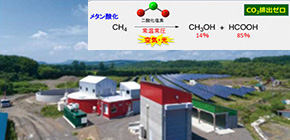
大阪大学:牛粪产生的液体燃料:二氧化碳排放量为零
-世界上第一个不排放二氧化碳的技术
北海道Okoppe镇,
大阪大学
北海道空气水
岩田千崎建设
2月9日,新闻发布会在札幌市举行,并宣布“将在两年内建造一个测试工厂”。
在2019年,我们签署了一项合作协议并一直在进行联合研究。
这次将增设两家私人公司,以使其在“ All Hokkaido”中投入实际使用。
朝日新闻
https://www.asahi.com/articles/ASP29750DP29IIPE005.html
世界第一!由甲烷气和空气合成甲醇
研究成果要点
-这次,甲烷气体将被转化为液态燃料甲醇和甲酸,“不会从空气燃烧中排放二氧化碳”。
通过使用二氧化氯作为反应物,“在常温常压下甲烷氧化的100%收率”成为可能。
-通常,“通过空气燃烧将甲烷气体转化为二氧化碳和一氧化碳”是很常见的。
但是,很难获得在生产过程中产生的有用物质,例如甲醇和甲酸。
-通过有效利用天然碳资源和利用甲烷水合物,在解决能源问题方面取得重大进展。
Resou
https://resou.osaka-u.ac.jp/ja/research/2017/20171211_1
Commercial production of methanol using biogas obtained from animal manures
Osaka University and Okoppe Town in Hokkaido, the northernmost prefecture of Japan,
concluded an agreement on the joint development of a technique for producing methanol from biogas and discussion of practical applications using technique for converting methane gas into
methanol,
a liquid fuel,
formic acid.
This technique
was developed by a group of researchers led by Professor OHKUBO Kei from the Osaka University Institute for Advanced Co-Creation Studies.
Okoppe Town
runs Okoppe Hokko Biogas Plant, which can annually produce biogas of 540,000 cubic meters from manure of 560 farm animals.
Methane (approximately 60% of biogas) produced at this plant is used for generating electric power.
In addition to electric power selling, the plant had been looking for effective applications for the commercialization of biogas.
ResOU